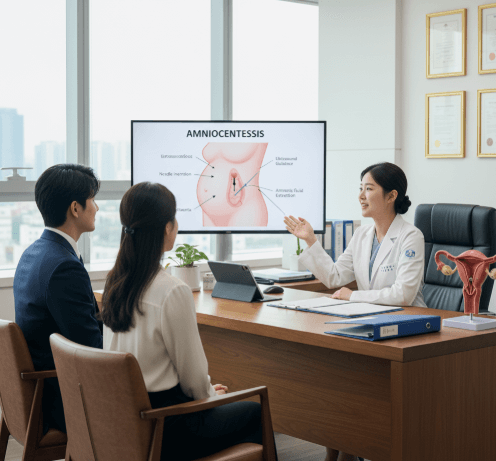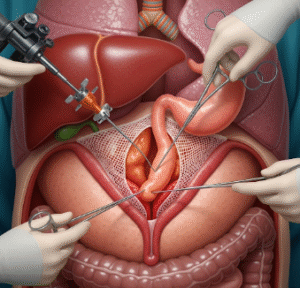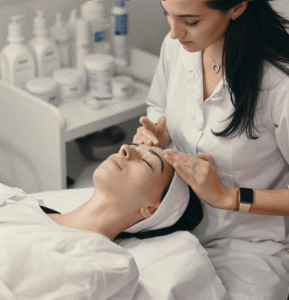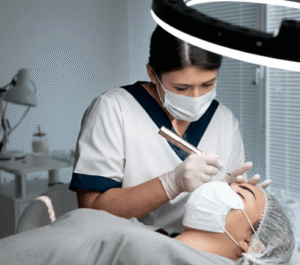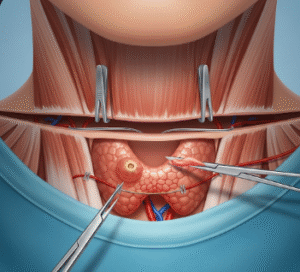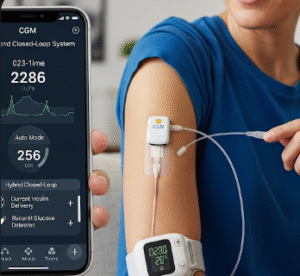What it is
Amniocentesis is a specialized prenatal diagnostic test where a doctor inserts a thin needle into the uterus to collect a small sample of amniotic fluid. This fluid contains fetal cells and important chemicals that provide valuable information about the baby’s health.
👩⚕️ Key aspects of amniocentesis:
- 🧬 Genetic testing – detects chromosomal abnormalities such as Down syndrome, Edwards syndrome, and Patau syndrome
- 🩸 Biochemical analysis – checks for metabolic disorders and infections
- 💧 Amniotic fluid assessment – measures fluid volume and maturity of fetal lungs
- 📅 Timing – usually performed between 15 and 20 weeks of pregnancy
In Korea, amniocentesis is conducted in specialized hospitals or university medical centers with advanced imaging and highly skilled obstetricians.
Why it’s done
Amniocentesis provides accurate diagnostic information that screening tests cannot always confirm.
🔹 Main reasons for amniocentesis:
➡️ Advanced maternal age – usually over 35, where chromosomal risks increase
➡️ Abnormal ultrasound or screening results – indicating possible genetic conditions
➡️ Family history of genetic disorders – such as cystic fibrosis, sickle cell anemia, or muscular dystrophy
➡️ Fetal lung maturity check – before preterm delivery, especially in high-risk pregnancies
➡️ Rhesus incompatibility – assessing severity when mother and baby have incompatible blood types
In Korea, doctors recommend amniocentesis when precise genetic confirmation is needed for informed decision-making.
Alternatives
Amniocentesis is highly accurate but also invasive, so many parents consider alternatives first.
🔸 Alternatives include:
- 🧪 Non-invasive prenatal testing (NIPT): Blood test that screens for chromosomal abnormalities with high accuracy
- 🖥️ Ultrasound screening: Detects structural anomalies and growth patterns
- 🧫 Chorionic villus sampling (CVS): Earlier test (10–13 weeks) analyzing placental tissue
- 🩺 Maternal serum screening: Less invasive, but only indicates risk level, not a definitive diagnosis
⚠️ Note: These alternatives may reduce the need for amniocentesis, but when precise diagnosis is required, amniocentesis remains the gold standard.
Preparation
Proper preparation ensures that amniocentesis is safe and effective.
✔️ Steps to prepare:
➡️ Review medical history with your doctor, especially previous pregnancies or complications
➡️ Avoid heavy meals before the procedure (light food is usually fine)
➡️ Stay hydrated unless otherwise instructed
➡️ Arrange for transportation and rest afterward, since light cramping or fatigue is common
➡️ Discuss all risks and benefits with your obstetrician beforehand
In Korea, doctors provide detailed counseling sessions before the procedure, ensuring that parents fully understand the process and results.
How it’s done
Amniocentesis in Korea is performed in a safe, sterile hospital environment with ultrasound guidance.
🩺 Step-by-step procedure:
- ✅ Ultrasound scan is done first to determine the safest spot for needle insertion
- ✅ Mother lies comfortably on the examination bed
- ✅ Abdomen is cleaned with antiseptic solution
- ✅ A thin needle is gently inserted through the abdominal wall into the uterus
- ✅ Around 20 ml of amniotic fluid is withdrawn for testing
- ✅ The needle is removed, and the baby is monitored via ultrasound
The procedure usually takes 10–20 minutes, and most mothers can go home the same day.
💡 Unique in Korea: Hospitals use real-time high-resolution ultrasound for maximum precision, significantly lowering the risks. Some centers even provide genetic counseling services right after the test.
Recovery
Recovery after amniocentesis is generally smooth, but mothers need to take extra care for 24–48 hours.
🟢 Post-procedure recovery tips:
- 🛌 Rest for at least 24 hours and avoid heavy lifting
- 🤰 Expect mild cramping or spotting, which usually resolves quickly
- 🩺 Contact the hospital immediately if severe pain, bleeding, or fluid leakage occurs
- 📅 Follow-up visits are scheduled to review results and monitor fetal well-being
In Korea, results are typically available within 1–2 weeks, and parents receive comprehensive counseling based on the findings.
Treatment options in Korea
South Korea is internationally recognized for cutting-edge prenatal diagnostics. Amniocentesis is performed in hospitals with advanced equipment and high safety standards.
🇰🇷 Where to get amniocentesis in Korea:
➡️ University hospitals – top choice for high-risk pregnancies and genetic concerns
➡️ Specialized women’s hospitals – offering experienced specialists in maternal-fetal medicine
➡️ Private clinics – comfortable settings, shorter wait times, and luxury facilities
➡️ Government-supported hospitals – affordable care under National Health Insurance
🌟 Highlights of amniocentesis in Korea:
- ✅ Advanced ultrasound technology for maximum accuracy
- ✅ Highly trained specialists with international experience
- ✅ Government subsidies covering part of diagnostic costs
- ✅ Integrated genetic counseling services before and after results
- ✅ Multilingual care for international patients in major hospitals (Seoul, Busan, Incheon)
✅ Final Note:
Amniocentesis in Korea is a highly reliable diagnostic tool that helps parents make informed decisions about pregnancy management. With advanced medical infrastructure, skilled professionals, and supportive counseling systems, Korea provides safe, accurate, and compassionate care for expectant mothers undergoing this procedure.

